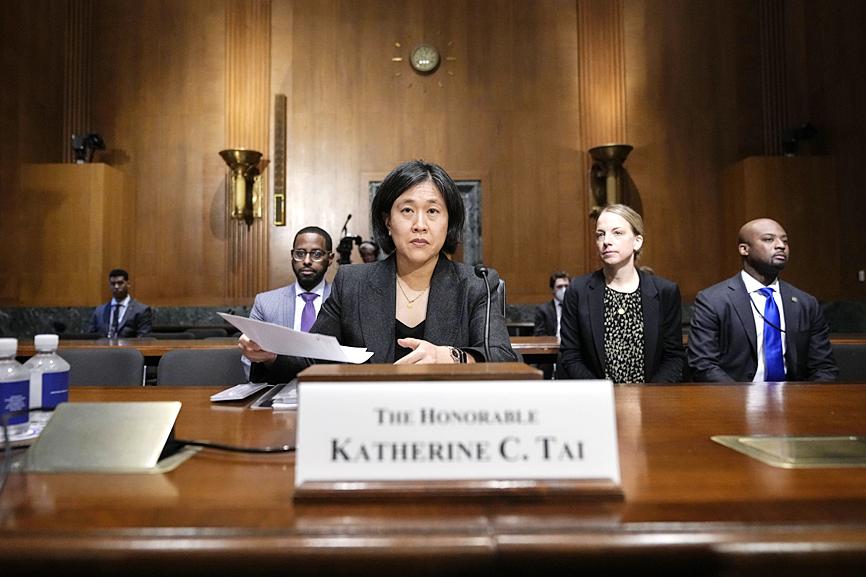US Trade Representative Katherine Tai (戴琪) on Thursday declined to say if Taiwan would be invited to join the Indo-Pacific economic plan of US President Joe Biden’s administration, spurring US Senate criticism that excluding Taipei would be a missed opportunity.
Taiwan has voiced its desire to be a “full member” in the forthcoming Indo-Pacific Economic Framework (IPEF), one part of the Biden administration’s effort to counter what it says is Beijing’s increasing economic and military coercion in the region.
The administration says the still fledgling IPEF aims to be inclusive, but it has not publicly detailed any membership plans. IPEF is intended as a flexible economic framework that would align members on supply chain security, infrastructure, labor standards, clean energy and other issues.

Photo: AFP
Tai, testifying before the Senate Finance Committee, called Taiwan an essential partner, but that no decisions had been made on membership.
“On the point of Taiwan, we are in general in conversations with those who are interested in joining this framework,” Tai said when asked by US Senator Bob Menendez if it would be invited to join the framework.
“Participation in the IPEF is still under consideration, and as far as I’m aware no decisions have been made,” said Tai, the US-born daughter of immigrants from Taiwan.
Menendez responded that Taiwan was a key strategic and trading partner intertwined with US economic security.
“I get a sense from that answer that we will not include Taiwan within the IPEF, which is missing an opportunity,” he said.
The exchange followed a letter released on Wednesday from 200 members of the US House of Representatives from both parties, including Republicans Michael McCaul, Liz Cheney and Elise Stefanik, and Democrats Ted Lieu (劉雲平), Ro Khanna and Elissa Slotkin, urging Tai and US Secretary of Commerce Gina Raimondo to invite Taiwan to join IPEF.
“Taiwan’s inclusion would also send a clear signal that the United States stands with its allies and partners, and will not be bullied by the PRC,” the representatives said, referring to the People’s Republic of China.
The letter was posted on the official Web site of US Representative Albio Sires, who also signed it.
Some analysts argue that Taiwan’s participation in the plan could make countries in the region hesitant to join for fear of angering Beijing, which opposes the idea as a tool for Washington to try to contain China’s rise.
Raimondo last week told members of the Senate Finance Committee that the administration was not contemplating Taiwan’s inclusion at this time, said two sources with knowledge of the closed-door meeting where she made the remark.
“I think it speaks to a broader issue that our trade agenda is sometimes just out of whack with our foreign policy agenda,” one of the sources said.
The US Department of Commerce referred a request for comment to the White House National Security Council, which also said no decisions had been made on membership.
Taiwan’s de facto embassy in Washington declined to comment on Raimondo’s remark, but a spokesman said: “Regarding IPEF, Taiwan continues to exchange views with the US through existing economic and trade mechanisms and channels.”

MAKING WAVES: China’s maritime militia could become a nontraditional threat in war, clogging up shipping lanes to prevent US or Japanese intervention, a report said About 1,900 Chinese ships flying flags of convenience and fishing vessels that participated in China’s military exercises around Taiwan last month and in January last year have been listed for monitoring, Coast Guard Administration (CGA) Deputy Director-General Hsieh Ching-chin (謝慶欽) said yesterday. Following amendments to the Commercial Port Act (商港法) and the Law of Ships (船舶法) last month, the CGA can designate possible berthing areas or deny ports of call for vessels suspected of loitering around areas where undersea cables can be accessed, Oceans Affairs Council Minister Kuan Bi-ling (管碧玲) said. The list of suspected ships, originally 300, had risen to about

DAREDEVIL: Honnold said it had always been a dream of his to climb Taipei 101, while a Netflix producer said the skyscraper was ‘a real icon of this country’ US climber Alex Honnold yesterday took on Taiwan’s tallest building, becoming the first person to scale Taipei 101 without a rope, harness or safety net. Hundreds of spectators gathered at the base of the 101-story skyscraper to watch Honnold, 40, embark on his daredevil feat, which was also broadcast live on Netflix. Dressed in a red T-shirt and yellow custom-made climbing shoes, Honnold swiftly moved up the southeast face of the glass and steel building. At one point, he stepped onto a platform midway up to wave down at fans and onlookers who were taking photos. People watching from inside

Japan’s strategic alliance with the US would collapse if Tokyo were to turn away from a conflict in Taiwan, Japanese Prime Minister Sanae Takaichi said yesterday, but distanced herself from previous comments that suggested a possible military response in such an event. Takaichi expressed her latest views on a nationally broadcast TV program late on Monday, where an opposition party leader criticized her for igniting tensions with China with the earlier remarks. Ties between Japan and China have sunk to the worst level in years after Takaichi said in November that a hypothetical Chinese attack on Taiwan could bring about a Japanese

The WHO ignored early COVID-19 warnings from Taiwan, US Deputy Secretary of Health and Human Services Jim O’Neill said on Friday, as part of justification for Washington withdrawing from the global health body. US Secretary of State Marco Rubio on Thursday said that the US was pulling out of the UN agency, as it failed to fulfill its responsibilities during the COVID-19 pandemic. The WHO “ignored early COVID warnings from Taiwan in 2019 by pretending Taiwan did not exist, O’Neill wrote on X on Friday, Taiwan time. “It ignored rigorous science and promoted lockdowns.” The US will “continue international coordination on infectious